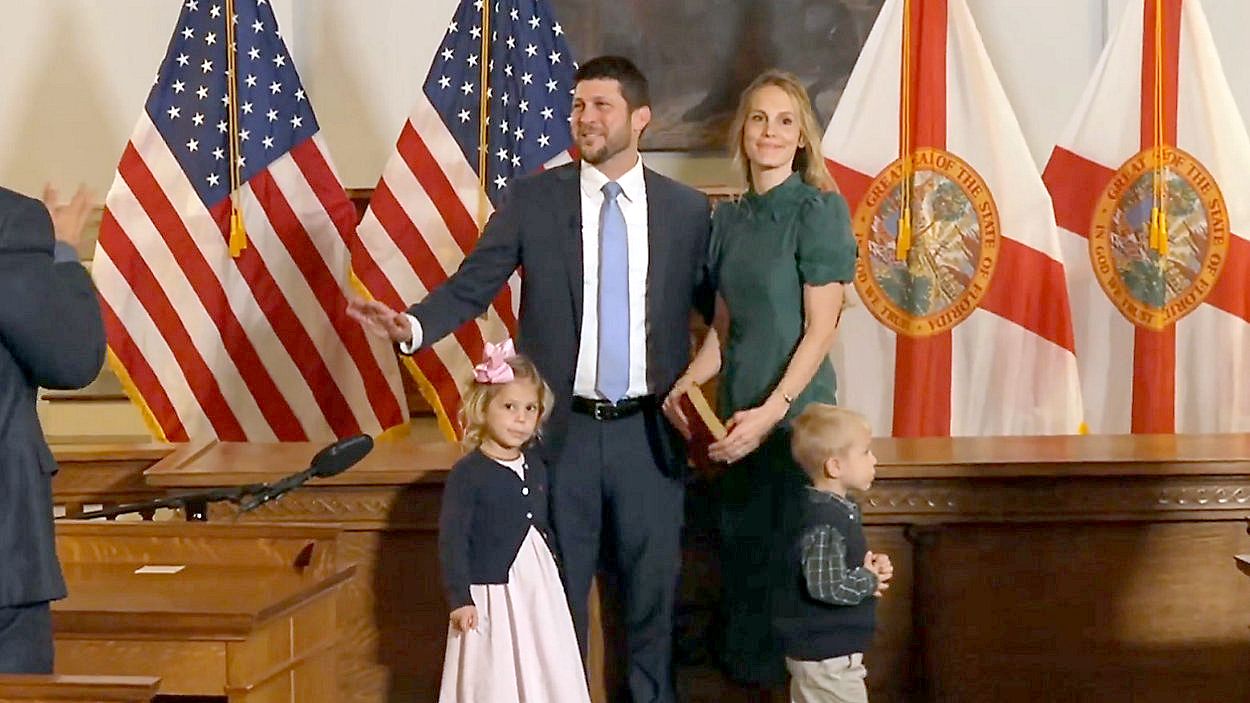TALLAHASSEE, Fla. — From fentanyl testing for suspected overdose patients and regulations for surrendered infants, to diabetes management in schools and liability for property damage in a hit-and-run, Florida Gov. Ron DeSantis announced he signed eight bills into law this week.
The bills, which all started off in the Florida House, cover a number of different topics — and some go into effect immediately, while others won't be active until later this year.
The bills DeSantis signed are:
HB 157: Service of Process
Among other things, House Bill 157 makes accommodations for process servers when they are unable to find the person needing to be served in a lawsuit. The bill — now law — makes it possible for the employees of the individual to be served in their stead, as long as it takes place at the business' registered office.
The legislation also changes some of the rules when "certain parties in the care of the (Florida) Secretary of State" are being served. Notably, the Secretary of State will no longer be required to "keep a record of all process served on the Secretary of State showing the day and hour of service" — which is from a line HB 157 removes from the law. As long as the party seeking service has exercised "due diligence to locate and effectuate personal service," the legislation also allows service to an individual, care of the Florida Secretary of State, when "an individual or a business entity is a nonresident or conceals his, her, or its whereabouts."
BH 157 took effect the moment DeSantis signed it into law.
HB 479: Leaving the Scene of a Crash Involving Only Damage to Vehicle or Property
Also signed into law by DeSantis this week was House Bill 479, which allows the court to order a driver convicted of leaving the scene of a crash to pay restitution to the other driver.
HB 479 adds the following line to Florida Statutes Section 316.061, Subsection 1: "The court may order a driver convicted of a violation of this section, who caused or otherwise contributed to the crash, to make restitution to the owner of a vehicle or other property damage in the crash for any damage that was caused by the driver's vehicle."
The law will go into effect on Oct. 1.
HB 597: Diabetes Management in Schools
House Bill 597 gives school districts, and individual schools, the ability to maintain a supply of glucagon so they can respond during an emergency situation involving someone with diabetes. It also lays out the rules and procedures that districts and schools must go through to request, receive and store the glucagon doses.
According to information U.S. National Institutes of Health, glucagon is used to treat hypoglycemia (low blood sugar levels) — as opposed to insulin, which is used to treat hyperglycemia (high blood sugar levels).
HB 597 amends Florida Statutes Section 1002.20 to include: "A school district or public school may acquire and maintain a supply of undesignated glucagon for the purpose of treating a student with diabetes experiencing a hypoglycemic emergency. Undesignated glucagon must be stored in a secure location on the school's premises that is immediately accessible to a school nurse or other school personnel trained to administer glucagon pursuant to this paragraph."
The bill also lays out procedures for the district or school to acquire glucagon — including standards for accepting donated glucagon — allows health care practitioners to prescribe glucagon to school districts or individual public schools, and regulates who is authorized to give a glucagon injection during an emergency.
HB 597 also gives any trained and authorized individual who gives, or tries to give, a glucagon injection — and the district that employs them — immunity from any civil or criminal liability that may arise from their actions.
The law will go into effect on July 1.
HB 615: Electronic Delivery of Notices Between Landlords and Tenants
House Bill 615 allows landlords and tenants the option to electronically deliver notices via email, as long as both parties have agreed to do so via an addendum to the rental agreement.
The language of the addendum — for the renter and the landlord — is specifically laid out in the bill.
A notice delivered by email — including claims against the renter's security deposit, correspondence from the renter about their plans to vacate or abandon the property, and any other communications, timely or not — is "deemed delivered at the time it is sent, unless the e-mail is returned to the sender as undeliverable."
Either party can revoke the electronic delivery agreement at any time — and any revocation will take effect upon delivery of a written notice from either party. Ending the agreement, though, will "not affect the validity of any notice previously sent by e-mail."
The law will go into effect on July 1.
HB 791: Surrendered Infants
House Bill 791 deals with the issue of parents surrendering infants and the equipment hospitals, medical services stations, and/or fire stations must have in place to be able to operate unmanned infant safety devices where parents can surrender their children.
The bill also revises the definition of an infant to mean a child who is 30 days old or younger when they are surrendered by their parents.
Additionally, it codifies the requirements of an "infant safety device" — which the bill describes as, "a device that is installed in a supporting wall of a hospital, an emergency medical services station, or a fire station and that has an exterior point of access allowing an individual to place an infant inside an and interior point of access allowing individuals inside the building to safely retrieve the infant."
The bill says that the act of surrendering an infant terminates any parental rights the individual may have had.
Infant safety devices can only be installed in facilities that are staffed 24 hours per day, and must be physically part of the building, climate controlled and ventilated, and equipped with an alarm system that automatically triggers an alarm inside the building when an infant is placed inside.
"A hospital, an emergency medical services station, or a fire station that uses an infant safety device to accept surrendered infants shall use the device's surveillance system to monitor the inside of the infant safety device 24 hours per day and shall physically check the device at least twice daily and test the device at least weekly to ensure that the alarm system is in working order."
The law will go into effect on July 1.
HB 1173: Florida Trust Code
According to a description on the Florida House website, House Bill 1173 lays out when the Florida Attorney General "has exclusive authority to represent certain interests relating to (a) charitable trust having its principal place of administration in this state."
Specifically, the bill allows the Attorney General to assert the rights of a beneficiary of the trust.
HB 1173 says: "Where the Attorney General asserts the rights of a qualified beneficiary as provided in paragraph (a), the Attorney General has the exclusive authority to represent the general public, unnamed charitable beneficiaries, and any person other than a named charitable beneficiary having a special interest in a charitable trust, in any judicial proceedings within this state or elsewhere, with respect to all matters relating to the administration of the charitable trust, including and without limitation, contract and trust law claims relating to charitable distributions and the exercise of trustee powers."
At the same time, the legislation prohibits an attorney general or other public officer from a different state from asserting the same rights or interests over a Florida-based charitable trust.
The law went into effect when DeSantis signed it.
HB 1195: Fentanyl testing
Named for Gage Austin Taylor, who died in 2022 from an accidental fentanyl overdose, Gage's Law, or House Bill 1195, requires a hospital or "hospital-based off-campus emergency department" to include a test for fentanyl with other diagnostic tests when treating a patient for a possible overdose or poisoning.
HB 1195 says that if health care workers are conducting a urine drug test "to assist in diagnosing the individual's condition, the hospital must include testing for fentanyl in the urine test." If the test comes back as positive for fentanyl, the bill says a confirmation test must be performed.
The bill also says that: "The results of the urine drug test and the confirmation test must be retained as part of the patient's clinical record for the period of time required by the hospital's current practice."
The law will go into effect on July 1.
HB 7003: A Review under the Open Government Sunset Review Act
House Bill 7003 exempts certain information being held by the Florida Office of Financial Regulation in "Financial Technology Sandbox applications" from public open record requirements.
According to the Office of Financial Regulation, a Financial Technology Sandbox was created by the office "to allow financial technology innovators to test new products and services in a supervised, flexible regulatory sandbox using exceptions to specified general law and waivers of the corresponding rule requirements under defined conditions."
The law will go into effect on Oct. 1.




